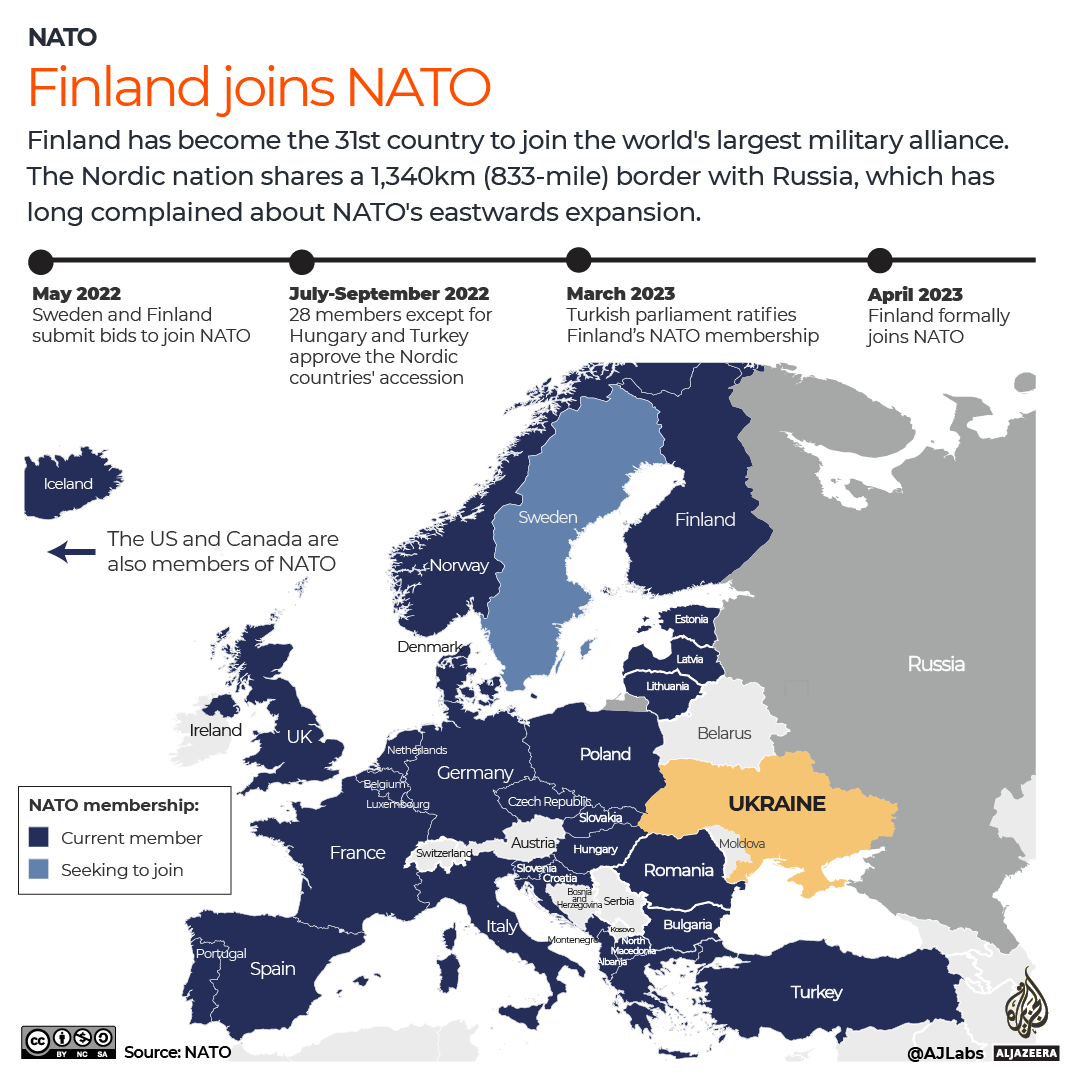
Less than a year after first applying for membership, Finland became the latest country to join NATO earlier this week – and given the Nordic nation’s history of non-alignment, its accession is significant.
The Western military alliance’s frontier with Russia has grown more than 800 miles with the addition of its 31st member.
Prior to the overt Russian invasion of Ukraine on February 24, 2022, Finnish public opinion was strongly in favour of staying out of the North Atlantic Treaty Organization (NATO). But after the Ukraine war erupted, most Finns changed their views and saw their country’s entry as necessary for maximising national security.
NATO’s most recent enlargement will boost morale in Ukraine, but also across other Central and Eastern European countries that perceive a major Russian threat.
“The accession of Finland and ultimately Sweden are the unintended – but surely not unanticipated – consequences of the Russian invasion of Ukraine,” John Feffer, director of foreign policy at the Institute for Policy Studies, told Al Jazeera.
Since the conflict began, the alliance has become more closely bonded, and regularly repeats its mantra – that NATO’s doors are open to countries that meet its requirements.
The Finnish move “proves it is possible to have a national debate about joining NATO while a war is happening nearby … and actually [have new countries] join NATO”, Edward Hunter Christie, former senior research fellow at the Finnish Institute of International Affairs, told Al Jazeera.
He added that this development creates greater alignment between NATO and the European Union in terms of coordinating policies as the Ukraine war rages on.
Indeed, now only five EU members are not NATO members: Austria, Cyprus, Ireland, Malta, and Sweden.
Moscow’s reaction
There is no doubt that Finland and Russia’s bilateral relationship has entered a new era.
Moscow now sees Helsinki as part of an alliance that threatens Russia and responded by warning about “counter-measures”, with defence chief Sergei Shoigu threatening a heightened risk of escalation in Ukraine.
“For Russia, this development is a major strategic and foreign policy defeat, because it is a strong and public vote of no confidence towards Russia,” explained Christie. “The nations in its neighbourhood cannot feel any trust towards Moscow, and their moves in the direction of NATO make that clear.”

But given long-standing NATO-Helsinki cooperation and the extent to which it is extremely unlikely that Russia would assault Finland, some experts believe that Moscow is all talk.
“Russia has so far reacted quite calmly to Finland’s accession,” Anatol Lieven, a senior research fellow at the Quincy Institute for Responsible Statecraft, told Al Jazeera.
“Finland always was in effect part of the West. It has no Russian minority, and Russia has no territorial claims against Finland.”
Experts maintain that Moscow’s attitude toward Finland would shift if United States troops and aircraft were deployed there.
But even then, “there would be no danger of a direct Russian attack on Finland, except in the context of a general war between NATO and Russia”, according to Lieven. “In such a war, however, Finland would be a sideshow.”
Although a strong Russian reaction to Finland’s accession to NATO is unlikely, further militarisation of the Finland-Russia border throughout the remainder of 2023 can be expected.
Europe will see “a slightly more hostile [Russian] policy towards Finland and in the Baltic Sea region, as part of a permanent search for possible areas of vulnerability”, according to Christie, who said that the Kremlin continues perceiving all of Russia’s European neighbours as “pieces on the chessboard that it would like to coerce or manipulate”.
Finland’s shift is illustrative of Europe’s new security architecture, in which the geopolitical space for “grey zone” countries such as Austria, Malta, Ireland, Serbia, and Switzerland is shrinking.
“Countries in the region do not want to be in an uncertain status that could tempt Russia into neo-imperialist acts, such as those that have been happening against Ukraine and, less violently, against Belarus or Moldova,” Christie told Al Jazeera.
Finland’s example is “a clear signal that, across the entirety of Eastern Europe, from north to south, every state that is geographically close to Russia wants protection from possible Russian aggression”, he said.
Looking ahead, with Finland and presumably soon Sweden – whose membership bid is lagging because of Turkish opposition – the alliance’s centre of gravity is shifting a little northward.
According to Feffer, this change “will have less influence perhaps on the war in Ukraine but more influence on the growing conflict over security and resources in the Arctic region”.







